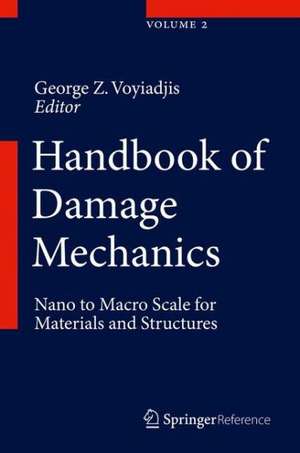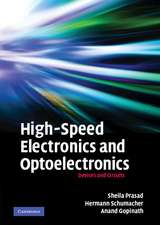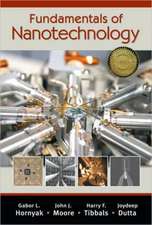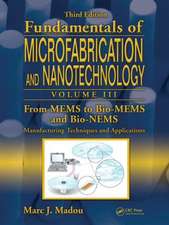Handbook of Damage Mechanics: Nano to Macro Scale for Materials and Structures
Editat de George Z. Voyiadjisen Limba Engleză Hardback – 17 sep 2014
Handbook of Damage Mechanics: Nano to Macro Scale for Materials and Structures is ideal for graduate students and faculty, researchers, and professionals in the fields of Mechanical Engineering, Civil Engineering, Aerospace Engineering, Materials Science, and Engineering Mechanics.
| Toate formatele și edițiile | Preț | Express |
|---|---|---|
| Hardback (2) | 2643.95 lei 38-44 zile | |
| Springer International Publishing – 27 feb 2022 | 5281.69 lei 3-5 săpt. | |
| Springer – 17 sep 2014 | 2643.95 lei 38-44 zile |
Preț: 2643.95 lei
Preț vechi: 3433.70 lei
-23% Nou
Puncte Express: 3966
Preț estimativ în valută:
505.98€ • 549.42$ • 425.02£
505.98€ • 549.42$ • 425.02£
Carte tipărită la comandă
Livrare economică 18-24 aprilie
Preluare comenzi: 021 569.72.76
Specificații
ISBN-13: 9781461455882
ISBN-10: 146145588X
Pagini: 1640
Ilustrații: LVI, 1579 p. In 2 volumes, not available separately.
Dimensiuni: 155 x 235 x 92 mm
Greutate: 2.56 kg
Ediția:2015
Editura: Springer
Colecția Springer
Locul publicării:New York, NY, United States
ISBN-10: 146145588X
Pagini: 1640
Ilustrații: LVI, 1579 p. In 2 volumes, not available separately.
Dimensiuni: 155 x 235 x 92 mm
Greutate: 2.56 kg
Ediția:2015
Editura: Springer
Colecția Springer
Locul publicării:New York, NY, United States
Public țintă
Professional/practitionerCuprins
Continuum Damage Mechanics Fundamentals: Some Basic Issues of Isotropic and Anisotropic Continuum Damage Mechanics.- Undamageable Materials and Damage Processes in Series and in Parallel.- Use of Fabric Tensors in Continuum Damage Mechanics of Solids with Micro-cracks.- Evolution of Fabric Tensors in Continuum Damage Mechanics of Solids with Micro-cracks: Studying the Effects of Length and Orientation.- Damage for Disordered Materials: Failure Mechanics of Geomaterials.- Fractals and Mechanics of Fracture.- Lattice and Particle Modeling of Damage Phenomena.- Toughening and Instability Phenomena in Quantized Fracture Process: Euclidean and Fractal Cracks.- Two-Dimensional Discrete Damage Models: Discrete Element Methods, Particle Models, and Fractal Theories.- Two-Dimensional Discrete Damage Models: Lattice and Rational Models.- Damage in Crystalline Metals and Alloys: Ductile Damage Behavior in Low-Cycle Fatigue for Polycrystalline Metallic Materials.- From Single Crystal to Polycrystal Plasticity: Overview of Main Approaches.- Micromechanics for Heterogeneous Material Property Estimation.- Microstructural Behavior and Fracture in Crystalline Materials: Overview.- Molecular Dynamics Simulations of Plastic Damage in Metals.- Numerical Applications in Damage-Induced Anisotropy in Low-Cycle Fatigue Modeling for Metals.- Damage in Structures: Damage in Prestressed Concrete Structures due to Creep and Shrinkage of Concrete.- Damage to Ship Structures Under Uncertainty: Evaluation and Prediction.- Elasto-dynamic Damage Evaluation of Bridges.- Materials Mechanical Characterizations and Structural Diagnoses by Inverse Analyses.- Damage Mechanics in Electronic Packaging: Adhesion and Failure of Polymer-Metal Interfaces in Microelectronic Packaging.- Damage Mechanics Unified Constitutive Modeling for Polymers.- Thermodynamics Theory for Damage Evolution in Solids.- Damage Mechanics in Metal Forming: Damage Prediction in Metal-Forming Process Modeling and Optimization: Simplified Approaches.- Ductile Damage in Metal Forming: Advanced Macroscopic Modeling and Numerical Simulation.- Ductile Failure Modeling: Stress Dependence, Non-locality and Damage to Fracture Transition.- Micromechanical Models of Ductile Damage and Fracture.- Micromechanical Polycrystalline Damage-Plasticity Modeling for Metal-Forming Processes.- Damage Micromechanics of Composite Materials, and Coupled Elastoplastic Damage-Healing Mechanics of Granular Materials: Fiber Cracking and Elastoplastic Damage Behavior of Fiber-Reinforced Metal Matrix Composites.- Micromechanical Elastoplastic Damage Modeling of Evolutionary Interfacial Arc Debonding for Fiber-Reinforced Composites.- New Strain-Energy-Based Coupled Elastoplastic Damage-Healing Mechanics Accounting for Matric Suction Effect for Geomaterials.- New Strain-Energy-Based Coupled Elastoplastic Two-Parameter Damage and Healing Models for Geomaterials.- Particle-Cracking Modeling of Metal-Matrix Composites.- Particle-Debonding Modeling of Metal-Matrix Composites.- Damage Under Dynamic Loading: Anisotropic Damage for Extreme Dynamics.- Plasticity Conditions and Failure Criteria for Quasi-brittle Materials.- Experimental Damage Characterization: Evaluating Damage with Digital Image Correlation: A. Introductory Remarks and Detection of Physical Damage.- Evaluating Damage with Digital Image Correlation: B. From Physical to Mechanical Damage.- Evaluating Damage with Digital Image Correlation: C. Applications to Composite Materials.- Micromechanics of Damage for Laminated Composites: Experimental Methods to Quantify Microdamage and Microstructure Anomalies in Fiber-Reinforced Polymer Composites: Overview.- Modeling Deformation and Damage of Random Fiber Network (RFN) Materials.- Predicting Damage Evolution in Composites with Explicit Representation of Discrete Damage Modes.- Nuclear Damage Characterization: Irradiation Damage in Nuclear Power Plants.- Recent Trends in Damage and Healing Mechanics: Healing, Super Healing, and Other Issues in Continuum Damage Mechanics.- Thermodynamics of Continuum Damage Healing Mechanics.- Continuum Damage-Healing Mechanics.- Modeling of Nonlocal Damage Using the Phase Field Method.
Notă biografică
George Z. Voyiadjis is the Boyd Professor at Louisiana State University in the Department of Civil and Environmental Engineering.
Caracteristici
Presents comprehensive constitutive equations for modeling behavior of materials subjected to damage Addresses healing in select applications Organized in precise topics that cover basic principles, numerical issues and computation, and applications Covers a wide range of materials including metals, polymers, ceramics, and composites Includes solved examples in engineering applications Includes supplementary material: sn.pub/extras











